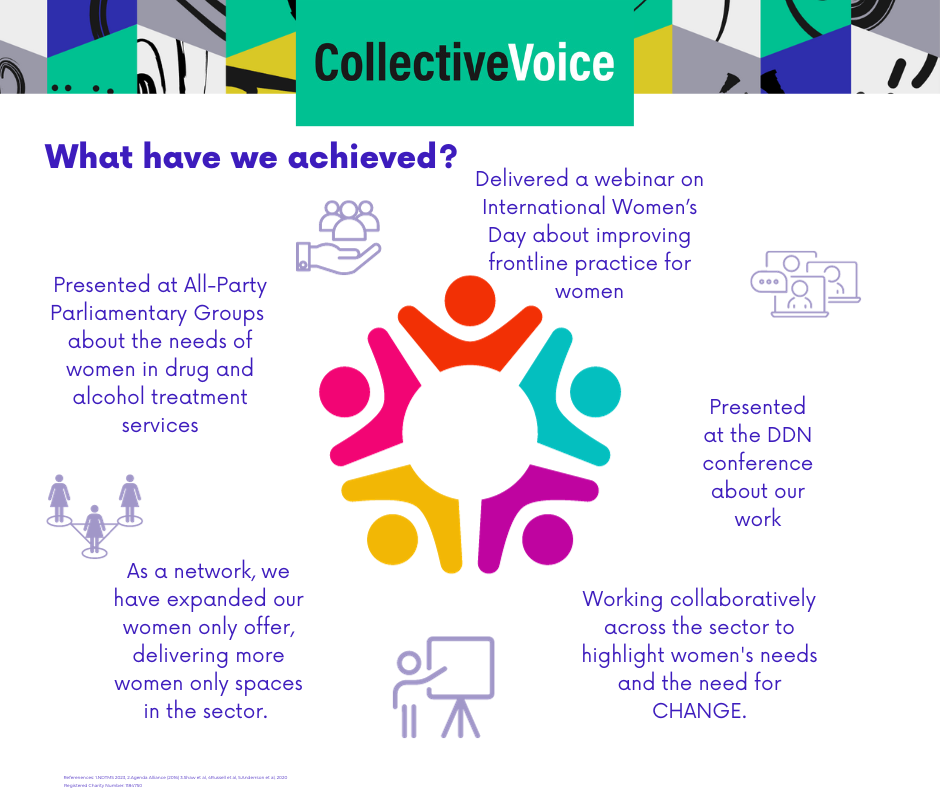
“Women make up 52% of the population but only 33% of our treatment services. Is this because they are not using substances, or is it that their use is different – often hidden – a need that perhaps goes unmet?”
This guest blog was authored by Hannah Shead, CEO of Trevi and outgoing Chair of the Collective Voice Women’s Treatment Working Group
When did the women’s treatment working group begin?
Whilst our first official meeting took place in December 2021, the reality is, I’ve been party to an increasing number of conversations over recent years with people who have been questioning how well our drug and alcohol treatment system is working for women….or rather how it’s not working for women.
When we began the group, it was a pretty informal space, and we didn’t think we would need to meet many times. Our meetings, held online every six weeks, quickly became a space where we could share ideas, alongside frustrations and challenges, and crucially develop our collective ambition to see things improve on the ground for women.
Why does this matter?
Well, we know that women make up 52% of the population but only 33% of our treatment services. Is this because they are not using substances, or is it that their use is different – often hidden – a need that perhaps goes unmet?
We must consider the specific barriers faced by women using substances.
NDTMS data for 2023 found that nearly 30% of women reported having a child living with them when they started treatment – we know that fear of social services involvement will deter women from seeking help…and indeed problematic drug use is a risk factor for families. Women using substances are six times more likely to have children removed than substance-using fathers. They are also more likely to attempt suicide than female substance users who don’t have children. There is an imperative upon all of us delivering or commissioning services to work well with mothers, this includes pregnant women.
We also know that what works well for women might look different to what will work for men. Far too many of the women who we work with are survivors of male violence. Women with histories of trauma and abuse are twice as likely to have an alcohol problem and eight times as likely to be drug dependent. If we are committed to providing a trauma informed offer for women, we need to think about how we create safe, women-only, spaces within our treatment system.
So, what have we achieved in the last two years?
Well, we’ve done some “stuff”….
We have written to OHID, we have spoken at an APPG, we hosted a webinar on international Women’s Day, and we will be hosting another one next year, focused on the needs of mothers.
We presented at the DDN Conference in Birmingham this year, and we have tried to have as many conversations as possible with our colleagues in the sector about what we want to see change for women.
We have also tried our hardest to do what we can within our own services and areas of influence….it was wonderful in September to meet in person at Ophelia House, the new women only residential in Oxford.
I have loved chairing this group. I have found the energy of the group a source of personal encouragement during times when violence against women and girls seems relentless. I have been heartened by the difference that we have found we can make. I have reached the end of my tenure as Chair, so will be handing over the reins to the incredible Kirsty Day from Nelson Trust who tells me “I am really excited to support the work of the women’s treatment group through serving as its Chair. Joining a group of pioneering female leaders who are keeping women’s voices central to the agenda is an absolute honour and I look forward to the work ahead in the coming year. “
Knowing the work of Kirsty at Nelson, and the ongoing determination of the others who are part of the Women’s Treatment Working Group, I think it is safe to say that I feel cautiously hopeful that, one day, our treatment system will respond more effectively to the needs of women…
Related Content
Collective Voice responds to the 10-year health plan
When the plan trumpets ‘a devolved and diverse NHS’, I wonder if it should really be saying ‘ a devolved and diverse health system’ Read
Collective Voice responds to the Independent Sentencing Review
There’s lots to welcome for our field, but the Government should approach some recommendations with caution. It would be a mistake to develop solutions today
The Government’s serious approach to synthetic opioids is welcome, but it can do more to provide national leadership
The Government is asking local areas to develop local preparedness plans and submit them for it to review. We can reasonably ask: what is in